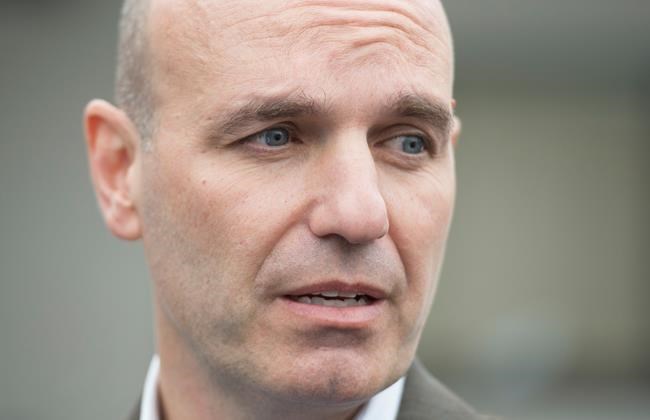
Nathan Cullen, liaison between the province of British Columbia and the Wet'suwet'en hereditary chiefs, speaks to media in Smithers, B.C., Friday, February 28, 2020. THE CANADIAN PRESS/Jonathan Hayward
Republished September 25, 2020 - 11:37 AM
Original Publication Date September 25, 2020 - 10:26 AM
VANCOUVER - The NDP's announcement that former MP Nathan Cullen is a candidate in the B.C. election has stirred controversy and put the nomination processes used by all the parties in the spotlight.
Annita McPhee, the former president of the central government for the Tahltan Nation, said the party broke its own rules when it selected Cullen after she submitted a nomination package last Friday.
The NDP has a policy that stipulates a woman or a member of equity-seeking group must replace retiring male members of the legislature. McPhee hoped to replace Forests Minister Doug Donaldson as the candidate in Stikine.
But B.C. NDP president Craig Keating said McPhee’s application contained invalid signatures from people supporting her nomination. The party tried to work with her to solve the problem, but it was too late, he said in a statement.
“There was simply not enough time to process the application," said Keating.
McPhee said party officials pointed out the problem on Sunday night and it was rectified within an hour, but she didn’t hear from them again until Monday, after Cullen had been announced as the candidate.
A spokesperson for the NDP said the party informed McPhee directly before any public statements were made, but McPhee said she first saw the news on Twitter.
"If they were truly exercising their equity mandate and wanting to attract diverse, strong candidates, you would work with people, such as myself, an Indigenous woman, to help sort that paperwork out, to allow time, or to at least explain what's going on,” she said in an interview.
"I just believe that I wasn't given a fair shot at the nomination.”
McPhee said 33 per cent of voters in Stikine are Indigenous.
"It's really unfortunate in this case because, you know, what does it say to Indigenous leaders, young Indigenous leaders who want to try in the future?” she added.
Keating said members of the riding association in Stikine approached 15 people in their search for candidates from equity-seeking groups, but none chose to put their names forward. That's when Cullen was tapped.
McPhee was not among those approached.
Megan Olsen, president of the riding association, said McPhee “made it clear to many members that she never again wanted to be associated with the NDP” after the federal NDP nomination process in 2019 for Skeena-Bulkley Valley.
McPhee said she was frustrated with the federal nomination process last year, but not with the provincial NDP in particular, since at the time she hoped to be a federal candidate.
Cullen, who couldn't be reached for comment, lives in Smithers and represented the area federally from 2004 to 2019.
Political science Prof. Gerald Baier of the University of British Columbia said a snap election is likely to benefit men, who are typically most represented in Canadian legislatures.
"On average, you know, a shorter period does benefit white males and we're seeing some truth to that in terms of the candidate profiles that are coming out,” said Baier, who specializes in Canadian politics.
He said party "insiders" often have the upper hand in nomination contests, which is particularly true in a snap election when candidates must be determined within a couple of weeks.
The New Democrats are not the only party fielding criticism about nomination processes.
A candidate who wanted to run for the B.C. Liberals in Chilliwack said she was informed last weekend that the party would not hold an open nomination and incumbent legislature member John Martin would be appointed.
Diane Janzen said she was approached last summer by a group of residents unhappy with Martin and she later decided to run.
Martin could not be reached for comment.
Once Janzen decided to throw her hat in the ring, she said party officials asked her to demonstrate support by drumming up members. The director of Chilliwack Community Services said she signed up about 160 members, more than doubling the party’s membership in the riding.
Janzen said party officials assured her repeatedly throughout the pandemic that the nomination would be contested.
In the end, she said she feels the party broke its promises in a “top-down process that was tone deaf to Chilliwack as a riding.”
Liberal spokesperson Shane Mills said the party was able to hold open nominations in several ridings over the course of the summer but not in all of them because of the snap election call.
Janzen said she was also told the COVID-19 pandemic posed challenges but she believes there was plenty of time to arrange mail-in or drive-thru ballots in the nomination process.
"The B.C. Liberals have been sending out emails to all their supporters for an entire year, saying that a snap election could be called at any time because it's a minority government being propped up by the Greens," she said.
"I wasn't asking to be greenlit or anything. All I wanted was the opportunity to compete."
The Conservative Party of B.C. has since announced on Twitter that Janzen is their candidate in Chilliwack.
This report by The Canadian Press was first published Sept. 25, 2020.
———
This story was produced with the financial assistance of the Facebook and Canadian Press News Fellowship.
News from © The Canadian Press, 2020